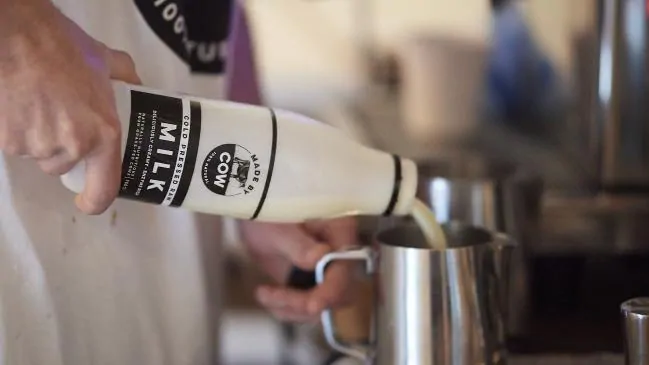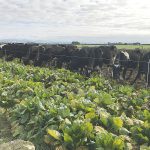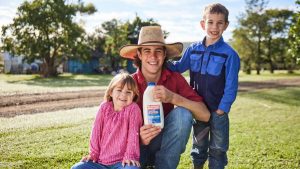
There’s a reason this milk is one of the most expensive dairy milk on the market.
Made By Cow is the world’s first cold-pressed raw milk, and its unique process is what adds those extra dollars to your bill.
The new NSW start-up uses high cold water pressure technology rather than heat to kill harmful bacteria in its milk, giving it about 10 days extra shelf life and extra health benefits.
It’s bottled straight from the farm — a single Jersey herd near Barry — and was approved for sale by the NSW Food Authority back in 2016.
Demand saw its owners push to make it more widely available and today it officially launched via 300 retailers, including Harris Farm, IGA and specialty organic shops, who are set to stock the unique milk by September.
Up until now, untreated milk, often known as raw milk, has needed to be heated to at least 72 degrees to destroy harmful bacteria.
While it is illegal to sell raw milk for human consumption in Australia, two years ago the Federal Government allowed high pressure processing (HPP) as a new alternative to heat pasteurisation.
This process is popular with fruit juice, which is sold as “cold-pressed juice”, and it is the same process used by Made by Cow.
COST AND BENEFITS
Made by Cow comes in two sizes, 1.5 litres for $6 and 750ml for $4, which is more expensive than two litres of full-cream milk from the a2 Milk Company that sells for $5.
“It’s the most expensive milk on the market, but it is the most expensive to make,” Made by Cow co-founder Saxon Joye told news.com.au
“All the things heat-based processing does to milk like squashing vitamins and enzymes, cold press does not. It is exactly the same as raw milk without the bacteria.”
Apart from retaining the live enzymes, Mr Joye said the cold-pressed milk was also filled with protein, potassium, calcium (38 per cent recommended dietary intake), vitamin B2 (52 per cent RDI) and vitamin B12 (48 per cent RDI).
“We’re a big change after many, many years — heat pasteurisation has been fantastic, but the technology has moved on, and we can now offer a raw product with extra shelf life that’s absolutely unmessed with that’s safe to drink, and it’s been very well embraced.”
According to Mr Joye, the world-first technology focuses on careful management and more hygienic milking practices to produce higher pressure.
“The pressure then destroys the harmful pathogens while being gentler on milk’s natural nutrients. The result is safe, unaltered, creamy, cold-pressed raw milk — straight from the farm to bottle,” Mr Joye said.
He has expectations of it not only becoming a major export opportunity for Australia but possibly following in the footsteps of the a2 Milk Company, which has a market capitalisation of $11.8 billion.
According to Mr Joye, several countries have already reached out to discuss the patented technology based in the Sydney suburb of Homebush.
“This is a very unique business in the fact they own the technology: Made By Cow holds patents for all the major contents across the world,” said former boss of Swisse Vitamins Radek Sali, who has taken a 27 per cent stake in Made By Cow.
Mr Sali, who aims to capitalise on the growing trend of farm to plate, sold Swisse Vitamins to Hong Kong-listed Biostime International Holdings in 2015 for $1.67 billion.
According to Made by Cow CEO and ex-Swisse executive Wade Porter, the brand’s milk contains more of milk’s natural goodness while still being 100 per cent safe from harmful bacteria.
“And we’re paying our farmers a premium — which is just as important as improved taste and nutrition profile.” Mr Porter said.
Due to how it’s made in the bottle, the milk can obtain a shelf life of up to six weeks.
About 9.7 billion litres of milk are produced each year in Australia, with the average person consuming 103 litres.
Globally, Australia is one of the highest consumers of milk, largely driven by the popularity of its coffee industry.
RISING MILK PRICES
The milk industry in Australia has hit the headlines countless times in 2019, as supermarkets cut the price they pay farmers for the white stuff, causing havoc across the industry.
As a result, Woolworths and Aldi increased the price of milk by 10c, which was a huge win for the farmers — but the industry stated it wasn’t enough, meaning there could be further price hikes down the line.

























